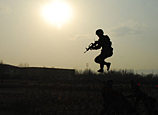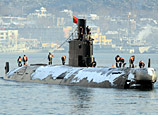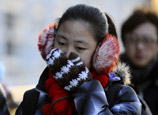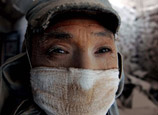
Key Words: France; French troops;triple troops; Mali;deployment delayed; deployment;"serval";
Related Reading:
>> French soldiers prepare for "Serval" operation in Mali
>> France continues airstrikes in Mali, regional forces to arrive soon
>> Germany to support French mission in Mali
>> France calls for int'l support in Mali operation
BAMAKO, Jan. 16 (Xinhua) -- France on Tuesday pledged to triple the size of its force fighting al-Qaida-linked rebels in Mali, while West African army chiefs postponed their agreement on deployment of regional troops.
France, which has already deployed hundreds of troops to the West African country and carried out scores of bombing attacks since Friday in the rebel-held northern half of Mali, said it plans to increase the number of troops to 2,500.
The commitment came as the Malian forces failed to repel Islamist rebels from Diabaly, a central town of strategic importance, despite five days of French air strikes.
Local residents saw a column of French armored vehicles leaving the capital Bamako and marching towards Diabaly late Tuesday, however, there is no official comments on probably the first major northward advancement of ground forces.
According to French sources, the well-armed and mobile rebels would be able to regroup and launch attacks in a vast region of desert and mountains, if the French air strikes were not followed immediately by ground attacks.
French President Francois Hollande, who has been visiting the United Arab Emirates, told reporters that his country's goal was to make sure when the troops leave and the intervention ends, Mali would have legitimate leaders, an electoral process and no more terrorists threatening its territory.
At the meantime, defense chiefs of Mali's neighbors meeting in Bamako, failed to agree on an UN-backed intervention plan which involves deployment of 3,300 regional troops. The troops are expected to take over the offensive.
The African army chiefs would continue their meeting on Wednesday.
The United States supported the immediate deployment of the African-led mission, primarily from the Economic Community of West African States (ECOWAS), State Department spokeswoman Victoria Nuland said.
It also welcomed the French military action in Mali. "So ... the United States very much welcomes the French military action in Mali, which came at the request of Mali's president, as well as support being offered by other governments," Nuland said.
She added that Washington was already providing intelligence to the French military, and was considering help them airlift forces into Mali and refuel their jet fighters.
So far, at least 13 countries have offered support for the embattled Mali, but only France sent in troops.
Fighting erupted in Mali in early 2013 after the government and Ansar Dine, an Islamist group demanding strict Sharia law across the country, failed to reach a deal on the crisis.
The United Nations has warned that the latest round of military clashes over the weekend have sparked a wave of displacement and led to the worsening of the humanitarian situation in Mali.
According to the UN Office for the Coordination of Humanitarian Affairs (OCHA), more than 30,000 people fled their homes over the weekend, bringing the number of internally displaced persons (IDPs) to more than 200,000.
The exodus coincided with the declaration of a state of emergency by the government and the beginning of a French air operation.
"The degradation of the sanitation, shelter, health and food security conditions which has been observed over the last nine months in the North is likely to be aggravated as the number of IDPs increases," OCHA spokesperson Jens Laerke said in Geneva.
















 Why supervision on 'drug chicken' lacks intensity?
Why supervision on 'drug chicken' lacks intensity?


![]()
